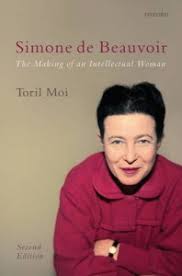Sarah Beckwith at nonsite:
 “To read a text isn’t to discover new facts about it,” says Moi, “it is to figure out what it has to say to us.”6 Understanding, meaning as use, responsiveness, responsibility, acknowledgement, the precision and inheritance of language: these are Toril Moi’s concerns in her refreshing, vitally important, generative book, a book that has the capacity to liberate us from language as a prison-house, and challenges and invites us into our own responsibility in words, as writers, readers, theorists, and critics. Moi wants us to wake up to the complexities of our inheritance of and use of language as if to invite us to exercise some stiffened and inflexible muscles to find greater, more various strengths and capacities. This is what makes this book such an exhilarating challenge and invitation at a time when literary studies seems to veer between the false allure of scientism (neurohumanities, “digital” humanities) and a fierce, entrenched moralism (which I take to be a stance which by-passes one’s own responses) and the professionalized credentializing, which sometimes appears to measure rather than judge academic work, all of which might break a graduate student’s spirit before she gets the chance to find her intellectual companions, and stand in the way of why she might ever have loved reading, thinking, and writing in the first place.
“To read a text isn’t to discover new facts about it,” says Moi, “it is to figure out what it has to say to us.”6 Understanding, meaning as use, responsiveness, responsibility, acknowledgement, the precision and inheritance of language: these are Toril Moi’s concerns in her refreshing, vitally important, generative book, a book that has the capacity to liberate us from language as a prison-house, and challenges and invites us into our own responsibility in words, as writers, readers, theorists, and critics. Moi wants us to wake up to the complexities of our inheritance of and use of language as if to invite us to exercise some stiffened and inflexible muscles to find greater, more various strengths and capacities. This is what makes this book such an exhilarating challenge and invitation at a time when literary studies seems to veer between the false allure of scientism (neurohumanities, “digital” humanities) and a fierce, entrenched moralism (which I take to be a stance which by-passes one’s own responses) and the professionalized credentializing, which sometimes appears to measure rather than judge academic work, all of which might break a graduate student’s spirit before she gets the chance to find her intellectual companions, and stand in the way of why she might ever have loved reading, thinking, and writing in the first place.
more here.
